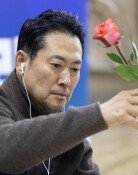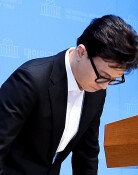Education on the Korean War
Education on the Korean War
Posted September. 11, 2010 10:38,
A ceremony marking the 60th anniversary of the Incheon landing will be held Wednesday on Wolmi Island off the coast of Incheon. A plan to have students from nine public schools in Incheon attend the event, however, has gone up in smoke. The citys education office sent a revised official letter sent by the Defense Ministry asking for student participation two weeks ago, saying, Schools are advised to ensure that no classes are missed according to the individual discretion of principals. An education supervisor called the move a decision based on the independent judgment by the education office. But this claim is hardly trustworthy. Do education authorities in Incheon find that attendance at the ceremony is not educational?
A similar incident is poised to unfold in Sangju County, North Gyeongsang Province. A ceremony commemorating the Battle of Hwaryeongjang, which occurred a month after the Korean War broke out on June 25, 1950, will be held for three days from Oct. 8. The Sangju education office also conveyed the Defense Ministrys letter to schools asking for student participation. The progressive Korea Teachers and Educational Workers Union and parents groups are protesting, however. The union called the request a non-educational order meant to teach war and a violation of the right to learn. The unions branch in North Gyeongsang said, Does the government intend to teach war with video images of a battle and chorus of the Korean War Song, and instigate another war anew? In response, the Sangju office said, It is perplexing to call the request an order meant to forcefully mobilize students when the letter was intended simply to guide them to attend voluntarily.
Recent surveys say as many as 57 percent of middle and high school students do not know what year the Korean War broke out. Thirty-five percent of public school students also believe that the war was started by a South Korean invasion. In addition, as many as 30 percent of the people doubt the results of a joint private-government investigation into the Cheonan sinking. How can inviting students to attend a ceremony commemorating the Korean War constitute an act meant to teach war when union members bring middle school students to a memorial ceremony honoring pro-communist militias active around the time of the Korean War?
Schools are not teaching the truth and lessons of the Korean War. The freedom and prosperity of the Republic of Korea were made possible thanks to the sacrifices of more than 200,000 South Korean and U.N. troops killed in the war. The lesson of remembering the nation`s fundamentals must be taught to students, who enjoy the benefits of economic prosperity amid their nations freedom and democracy. So to those who criticize education on the Korean War as war education or an order meant to forcefully mobilize students, what do they want to teach students?
Editorial Writer Yook Jeong-soo (sooya@donga.com)






![[김순덕의 도발] ‘李부터 연임’ 개헌, 이 대통령은 가능성을 말했다](https://dimg.donga.com/c/138/175/90/1/wps/NEWS/IMAGE/2026/01/16/133172656.1.jpg)
